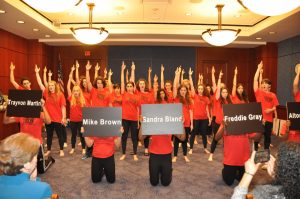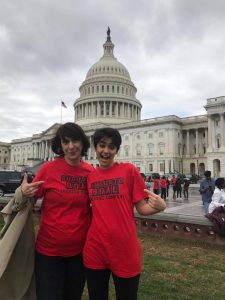On March 27th and 28th I was part of a company of actors, directors and students who presented a 30 minute political theatre performance at the Congress and State Senate in the United States Capital Building. All members of the company (including me) have attended the Carnegie Mellon Pre-College Drama Program where we were taught the techniques of Brazilian theatre activist Augusto Boal. The focus of Boal’s work was to use theatre in a political context, as a tool for understanding, education and growth. At Carnegie Mellon we were exposed to a form of Boal’s work called Image Theatre. These are brief scenes which consist of very little or no speaking. The images tell a story in a condensed form and take no more than a minute or two to accomplish a strong visual that an audience can easily understand, identify, and apply to their own lives.
After 11 hours of rehearsals, 40 of us went inside a conference room in the Capital Building and presented image pieces on The Dreamers Act, Black Lives Matter, Unity in Government, Mental Illness and Sexual Violence. I personally assisted in directing the image piece on the Dreamers Act, a bill that the Congress and the State Senate are currently debating and formulating.



Having the chance to perform before representatives of the Senate was a huge honor. At the conclusion of our performance, the US Senator of New Hampshire, Senator Shaheen told us that a theatrical performance like ours had never before been done at the Capital building. She hopes our pieces stir positive actions around formulation of the bills in the Senate. She then gave us a tour of the entire building and even took us into the gallery to watch the Senate in session!

By physically performing in a space where political decisions are made and using theatre as a political tool to engage with that change-making process proved to me the value of arts activism. A strong visual with bodies in space is so much more engaging than reading words on paper or listening to a lecture. The premise of what we did was both visually stimulating and socially acute, which is what made Boal’s work at the Capital an effective example of how theatre can be used for social change. My experience at the Capital could not have been possible without the support and funding from a Middlebury College Community Engagement Mini-Grant. Thank you for making me it possible for me to participate in this historic event, doing what I love to do!
